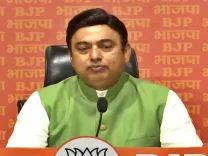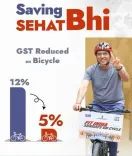Should BJP MPs Encourage Manufacturers and Traders to Pass on GST Rate Cuts to Consumers?

Synopsis
Key Takeaways
- Manufacturers and traders are urged to pass on GST savings to consumers.
- Lower prices are expected to drive demand and enhance economic prosperity.
- The resolution emphasizes fairness and shared growth.
- GST reforms have simplified the tax structure and increased compliance.
- The GST taxpayer base has more than doubled in eight years.
New Delhi, Sep 7 (NationPress) The BJP Parliamentary Party convened on Sunday and reached a unanimous decision urging manufacturers and traders, both large and small, to ensure that the recent GST reductions declared by the government led by Prime Minister Narendra Modi are directly passed on to consumers.
"By transferring every saving and every relief, we uphold the Prime Minister’s vision while enhancing the trust between shopkeepers and customers, and traders and citizens. Lower prices will stimulate higher demand, which in turn will foster prosperity for businesses, and this prosperity will fortify the strength of our nation," stated the resolution introduced by Commerce Minister Piyush Goyal during the meeting.
"We must ensure that the GST reforms under Prime Minister Narendra Modi are recognized as a significant achievement of governance and a promise fulfilled to the people of India. These transformative changes represent our unity, equity, and shared growth. It is now the responsibility of every trader to pass on every rupee of relief to consumers, transforming reforms into a better living standard, increased demand, and a more prosperous economy. This is the Modi government’s appeal—a call for fairness, growth, and for every family in India to experience these benefits. It is a call for an Aatmanirbhar Bharat," it added.
The resolution emphasizes that the new GST reforms boost production, promote consumption, and significantly contribute to the nation’s revenue.
The reforms have also simplified the system, placing the citizen at its core. The rates on essential items such as food and medicines, along with prices of electronic goods, have seen significant reductions. Distortions like inverted duties are being corrected, and processes for small businesses, exporters, and startups are being streamlined, it noted.
These reforms reflect our government’s commitment to enhancing the lives of our citizens, empowering traders, and reinforcing India’s path to self-sufficiency. Steady growth in the monthly collection reaching Rs 2 lakh crore indicates greater compliance and buoyancy in our economy, the resolution further states.
The resolution also recalls that eight years prior, under the decisive leadership of Prime Minister Narendra Modi, India adopted the Goods and Services Tax, fulfilling the vision of “One Nation, One Tax.”
What was once a convoluted tax structure of VAT and multiple taxes, which hindered our country with a sluggish and fragmented economy and endless waits at inter-state toll booths, has now been replaced by a unified market that has brought fairness, simplicity, and strength to our economy, it said.
Before 2014, while previous governments struggled to implement GST, Prime Minister Narendra Modi not only introduced it but did so with consensus from across the nation, the resolution further stated.
In merely eight years, the GST taxpayer base has more than doubled from 66 lakh in 2017 to over 1.5 crore today, with annual collections exceeding Rs 22 lakh crore in FY 2024–25, growing at a CAGR of over 18%. GST collections have now reached close to Rs 2 lakh crore monthly, significantly higher than at the time this historic reform was instituted, the resolution concluded.







